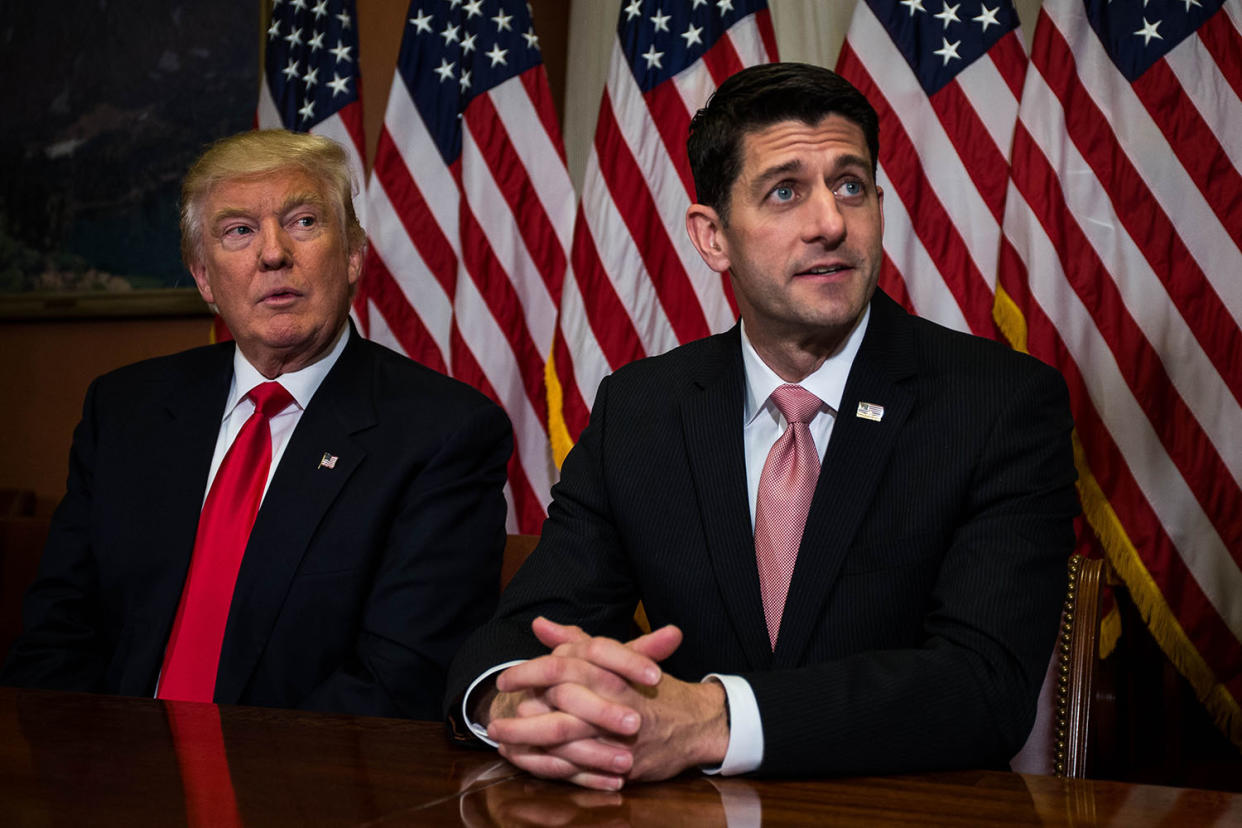Stories to watch: The Trump-Ryan frenemy relationship

Donald Trump is in the White House, and Yahoo News is taking a look at the top stories to watch in his first 100 days. From the unusual role family members will play as White House advisers, to his promises to aggressively transform U.S. trade policy, and from investigations into Russian interference in the election to his relationship with Paul Ryan, we’ll be rolling out 15 stories over five days — signposts for the road ahead.
_____
THE STAKES
President-elect Donald Trump and House Speaker Paul Ryan are only a pair because of the powerful positions they hold, and because they are both Republicans. In every other way, they could not be more different. And while they have had a surprisingly pleasant honeymoon since Trump’s election in November, it won’t take long for them to clash. There are three ways in which they will do so: over style, issues, and the Constitution.
____
THE STORY
At the most basic level, Trump and Ryan’s personal styles are alien to one another. Trump usually speaks negatively about issues, expressing and channeling anger and pointing out problems. Ryan approaches things with a more positive, constructive tone, and seeks to stress solutions. That rubs many Trump supporters — who see this as whistling past the graveyard — the wrong way. Trump campaigned as someone who would rip establishment Washington up by the roots and create a new reality in the capital, and much of his inaugural address continued this theme. Ryan prefers incremental change, and believes that reform can easily become destructive if not carried out soberly and deliberatively.
This, as much as anything, is what has caused Trump and many of his supporters to vilify the Wisconsin Republican. In fact, Trump’s own senior adviser, Stephen Bannon, used to describe Ryan as “the enemy” and just over a year ago told reporters at Breitbart News — which Bannon used to run — that he hoped Ryan would be driven from the Speakership within a few months.
On issues, Trump and Ryan are on different sides of some core issues: trade, entitlement spending, and immigration. Trump demonized free trade deals during the campaign. Ryan has been a big advocate for free trade. Trump has vowed not to change Medicare or Social Security. Ryan has long described those programs as driving the national debt, and wants to overhaul them.
Trump has disparaged immigrants, instituted travel restrictions from seven predominantly Muslim countries via an executive order last week, and slammed a federal judge last summer for bias because he was of “Mexican heritage.” Ryan rebuked Trump for the latter comment, saying it was “the textbook definition of a racist comment.” Ryan has tried to work toward a solution to the nation’s problem with illegal immigration, unlike Trump, who has merely denounced the government for not fixing the problem. As president, Trump will find that solving problems is far more difficult than complaining about them.
The two men also have a fundamental different approaches to the role of government and guidance of the U.S. Constitution. Ryan comes from a political and deeply conservative background, and so he believes in the Constitution’s prescriptions for how the government should work. Among other things, the Constitution clearly limits the president’s authority and hems in the office. Trump comes from a nonpolitical background, is not known for reading much of anything, and it’s not clear whether he’s ever actually read the Constitution. He made many statements throughout the presidential campaign that promised unconstitutional actions, and often issued vague threats to people who criticized him. If he were to continue this kind of behavior in office, it would be more fitting for a third world dictator than for a U.S. president, and at some point, Congress would need to step in. Ryan is the leader of one half of Congress. He believes in the American system. It is far from clear that the new president does.
While Ryan has been a more public foil for Trump over the last year, it may be that Senate Majority Leader Mitch McConnell of Kentucky ends up becoming the president-elect’s more formidable adversary. McConnell will work with Trump plenty of the time, but if and when McConnell decides not to go along with Trump, he has far more procedural power to resist. The Senate is — by constitutional design — more independent from the public’s emotions than the House, because its members are elected every six years instead of every two. And on most measures, McConnell will still need a few Democrats to side with Republicans to overcome the 60-vote threshold needed to pass controversial legislation. Republicans have a 52-to-48 majority in the Senate, far short of a 60-vote super-majority.
For the time being, Ryan and Trump have incentives to work together. Ryan sees Trump as a vehicle, imperfect as he might be, who can help him pass a tax reform package that he has been working on for years. And he hopes that with time he can bring Trump around to his point of view on reforming entitlements and immigration. Trump knows that Ryan is held in extremely high regard by the majority of Republicans in Congress. If Trump were to disrespect Ryan off the bat, he would enter the presidency with very little power to sway or work with Congress. However, once Trump has gotten his footing, after the first six months or so of his presidency, how he works with Ryan and Congress, or not, will determine much about the next four years.
____




